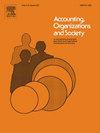Navigating the spectrum of aggressiveness: Social dynamics and anxieties in tax planning
IF 3.6
2区 管理学
Q1 BUSINESS, FINANCE
引用次数: 0
Abstract
This qualitative inquiry investigates how tax professionals understand aggressiveness in tax planning and how they position themselves on the spectrum of aggressiveness. Based on semi-structured interviews with 33 experienced Canadian tax professionals from top-10 accounting and law firms, we find that tax professionals understand aggressiveness through a web of inter-related considerations. These include creativity, complexity, legal ambiguity, and lucrativeness, associated with risks of tax audits, technical errors, disputes with tax authorities over legal interpretations, and reputational damage for the client, the tax professional, and their firm. These considerations and related risks are often a source of anxiety for tax professionals. Drawing on contemporary philosopher Charlie Kurth's distinction between “punishment anxiety” and “practical anxiety,” we identify an intricate interplay between these two forms of anxiety and a collective deliberation process involving clients and colleagues, each bringing their own risk-reward preferences, which shapes professionals' decisions of how aggressive they should be. The socio-affective conceptualization of aggressiveness that we propose in this study contributes to the tax literature by deepening our understanding of the elusive concept of tax aggressiveness. It also enriches the broader literature on accounting and finance professionals' emotions at work by documenting the analytical value of a nuanced understanding of anxiety. Furthermore, it advances the professional ethics literature by highlighting the moral significance of practical anxiety in professional judgment about risky, ethically sensitive issues.
驾驭侵略性的光谱:税收筹划中的社会动态和焦虑
这个定性调查调查税务专业人士如何理解侵略性在税收规划和他们如何定位自己在侵略性的频谱。基于对来自前10名会计和律师事务所的33名经验丰富的加拿大税务专业人士的半结构化访谈,我们发现税务专业人士通过一系列相互关联的考虑因素来理解侵略性。其中包括创造性、复杂性、法律模糊性和盈利性,这些都与税务审计风险、技术错误、与税务机关就法律解释产生的纠纷以及对客户、税务专业人员及其公司的声誉损害有关。这些考虑和相关风险往往是税务专业人士焦虑的根源。根据当代哲学家查理·库尔斯(Charlie Kurth)对“惩罚焦虑”和“实践焦虑”的区分,我们确定了这两种形式的焦虑之间复杂的相互作用,以及涉及客户和同事的集体审议过程,每个人都有自己的风险回报偏好,这决定了专业人士应该采取多大的激进行动。我们在本研究中提出的攻击性的社会情感概念化,通过加深我们对税收攻击性这一难以捉摸的概念的理解,有助于税收文献。它还通过记录对焦虑的细致理解的分析价值,丰富了有关会计和金融专业人士在工作中的情绪的更广泛的文献。此外,通过强调实践焦虑在对风险、道德敏感问题的职业判断中的道德意义,促进了职业伦理文献的发展。
本文章由计算机程序翻译,如有差异,请以英文原文为准。
求助全文
约1分钟内获得全文
求助全文
来源期刊

Accounting Organizations and Society
BUSINESS, FINANCE-
CiteScore
7.80
自引率
6.40%
发文量
38
期刊介绍:
Accounting, Organizations & Society is a major international journal concerned with all aspects of the relationship between accounting and human behaviour, organizational structures and processes, and the changing social and political environment of the enterprise.
 求助内容:
求助内容: 应助结果提醒方式:
应助结果提醒方式:


